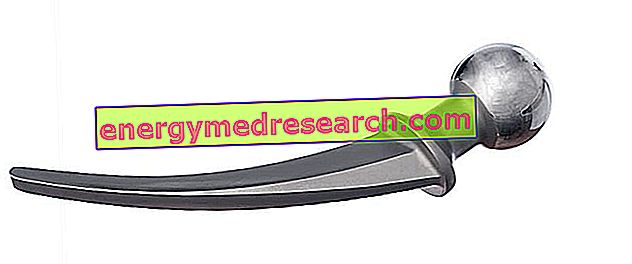
When the hip - that is the joint that connects the trunk with the lower limbs and allows the human being to stand upright, walk, run etc. - undergoes a serious deterioration, it is possible that it must be replaced with a prosthesis .
Modern hip prostheses consist, in fact, in a replica of the original bone elements of the hip . In fact, they consist of:
- A stem, which is equivalent to the proximal part of the femur.
- A head, which represents the so-called femoral head. It has a ball shape.
- A cup, inside which a particular insert is housed, which is equivalent to the acetabulum. The acetabulum is the concave bone within which the femoral head is housed.
The aforementioned parts of the prosthesis can be made of different materials: metal (alloys), polyethylene and / or ceramic .
A few years ago, exactly in 2010, several research groups discovered (and observed on patients) that the prosthetic models with the head and the metal insert can have harmful effects on human health.
It appears that the two metal components, in contact with each other, react improperly, producing debris that corrodes the surrounding bones and diffuse into the bloodstream.
At the time of the first observations, to confirm the existence of such processes - identified with the term of metallosis - were the blood tests ; these reported high levels of chromium and / or cobalt ions (NB: the metals that are usually hip replacements).
Since then, the Medicines and Healthcare products Regulatory Agency (MHRA) has established that anyone who possesses a prosthesis with a metal head and insert (metal-to-metal hip prosthesis) undergoes periodic checks on their health, in order to monitor the situation.
WHAT ARE THE POSSIBLE SYMPTOMS / DISORDERS?
The effects that a metal-to-metal hip prosthesis can cause are varied.On the basis of the analyzes conducted, doctors and researchers recorded, on a fair number of patients, the presence of:
- Pain in the groin area, hip and / or leg
- Swelling near the artificial joint
- Headache
- Vision changes and hearing loss
- Skin erythema
- Vertigo
- Chest pain or shortness of breath
- Sense of weakness and generalized fatigue
- Cold sensation
- Sudden memory loss
The surveys carried out since 2010 have confirmed that this symptomatology is the result of problems with the heart, the nervous system and the thyroid .



